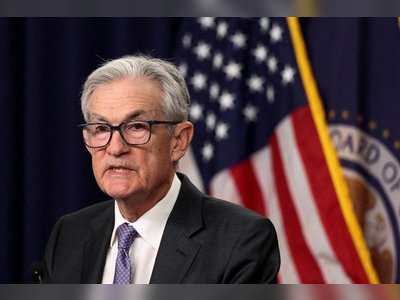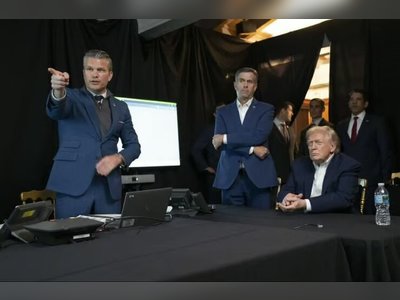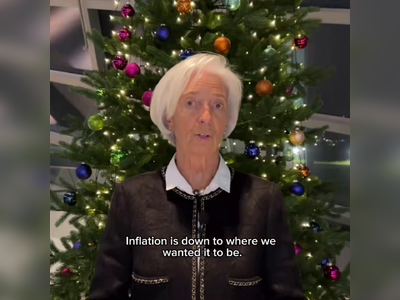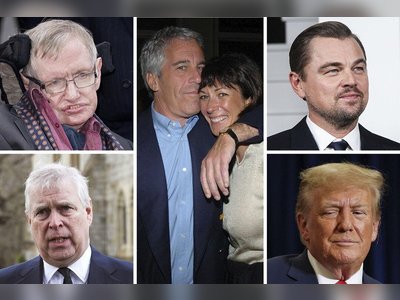
U.S. Faces New Budget Standoff as Deadline Approaches
A potential federal government shutdown looms as Donald Trump calls on Congress to avert crisis before Friday's deadline.
As the deadline for federal funding approaches, the United States is once again on the brink of a government shutdown, just three months after a similar budgetary crisis was narrowly avoided.
President Donald Trump, speaking aboard Air Force One, acknowledged the seriousness of the situation, stating, "We’ll see, but it could happen" regarding the likelihood of the federal government running out of funds overnight on Friday.
A government shutdown would result in numerous federal employees being furloughed without pay until a resolution is reached; disruptions in air traffic are anticipated, and the distribution of certain food assistance programs for low-income families could be affected.
In December, Congress had managed to avert such a shutdown just before Christmas, pushing the deadline to March 14. Due to the historically unpopular nature of government shutdowns, Trump is actively seeking to prevent this scenario from unfolding.
He recalls the 35-day partial federal shutdown during his first administration, which resulted from a standoff with Democrats over funding for his proposed border wall with Mexico.
Trump has publicly endorsed a budget proposal presented on Saturday and urged Republican lawmakers to support the measure, which would fund the federal government through September.
This temporary measure aims to provide greater flexibility in the future budget negotiations, potentially including funding for key initiatives such as his migrant deportation program.
The Republican leadership in the House of Representatives, under Speaker Mike Johnson, faces challenges due to their narrow majority.
Johnson cannot afford to lose more than a handful of votes, as some conservative members, advocating for fiscal orthodoxy, traditionally oppose temporary funding measures, arguing they exacerbate the national debt.
"We must remain UNITED – NO DISSENT," Trump stressed at a recent event.
Democrats have already indicated their opposition to the proposed funding bill amid significant cuts to public services.
Elon Musk, the world’s wealthiest individual and a prominent supporter of Trump during the 2024 campaign, has been influential in promoting substantial changes to federal agencies.
As head of a government efficiency commission since Trump’s victory, Musk has initiated the dismantling of several government agencies, alleging fraud and mismanagement, resulting in the layoff of tens of thousands of federal employees.
Democratic Representative Rosa DeLauro criticized the Republican proposal, calling it a "blank check for Elon Musk" and claiming it shuts down negotiations between parties.
If the bill passes the House, it must still clear the Senate, where some Democratic support will be essential.
Senator Tim Kaine, the Democratic nominee for vice president in 2016, has condemned the legislation, claiming it will harm ordinary people and redirect funds towards tax credits benefiting the ultra-wealthy.
As the deadline approaches, both political factions are deflecting responsibility for any potential government paralysis.
Mike Johnson argued it will be up to Senate Democrats to "do what is right," expressing doubt that they would choose to shut down the government.
Conversely, Democratic Minority Leader Hakeem Jeffries accused Republicans of being determined to disrupt government operations and jeopardize the economy.
The unfolding situation places both parties in a high-stakes game of political maneuvering ahead of the impending deadline.
President Donald Trump, speaking aboard Air Force One, acknowledged the seriousness of the situation, stating, "We’ll see, but it could happen" regarding the likelihood of the federal government running out of funds overnight on Friday.
A government shutdown would result in numerous federal employees being furloughed without pay until a resolution is reached; disruptions in air traffic are anticipated, and the distribution of certain food assistance programs for low-income families could be affected.
In December, Congress had managed to avert such a shutdown just before Christmas, pushing the deadline to March 14. Due to the historically unpopular nature of government shutdowns, Trump is actively seeking to prevent this scenario from unfolding.
He recalls the 35-day partial federal shutdown during his first administration, which resulted from a standoff with Democrats over funding for his proposed border wall with Mexico.
Trump has publicly endorsed a budget proposal presented on Saturday and urged Republican lawmakers to support the measure, which would fund the federal government through September.
This temporary measure aims to provide greater flexibility in the future budget negotiations, potentially including funding for key initiatives such as his migrant deportation program.
The Republican leadership in the House of Representatives, under Speaker Mike Johnson, faces challenges due to their narrow majority.
Johnson cannot afford to lose more than a handful of votes, as some conservative members, advocating for fiscal orthodoxy, traditionally oppose temporary funding measures, arguing they exacerbate the national debt.
"We must remain UNITED – NO DISSENT," Trump stressed at a recent event.
Democrats have already indicated their opposition to the proposed funding bill amid significant cuts to public services.
Elon Musk, the world’s wealthiest individual and a prominent supporter of Trump during the 2024 campaign, has been influential in promoting substantial changes to federal agencies.
As head of a government efficiency commission since Trump’s victory, Musk has initiated the dismantling of several government agencies, alleging fraud and mismanagement, resulting in the layoff of tens of thousands of federal employees.
Democratic Representative Rosa DeLauro criticized the Republican proposal, calling it a "blank check for Elon Musk" and claiming it shuts down negotiations between parties.
If the bill passes the House, it must still clear the Senate, where some Democratic support will be essential.
Senator Tim Kaine, the Democratic nominee for vice president in 2016, has condemned the legislation, claiming it will harm ordinary people and redirect funds towards tax credits benefiting the ultra-wealthy.
As the deadline approaches, both political factions are deflecting responsibility for any potential government paralysis.
Mike Johnson argued it will be up to Senate Democrats to "do what is right," expressing doubt that they would choose to shut down the government.
Conversely, Democratic Minority Leader Hakeem Jeffries accused Republicans of being determined to disrupt government operations and jeopardize the economy.
The unfolding situation places both parties in a high-stakes game of political maneuvering ahead of the impending deadline.











